Sim-plicity: I am a rocket "scientist"
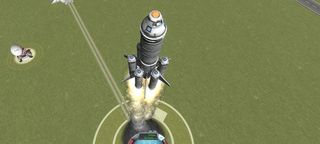
Having retired from world-saving heroics, Christopher Livingston is living the simple life in video games by playing a series of down-to-earth simulations, though this week is less down-to-earth and more up-to-space as he attempts to create his own space program and learns that what goes up, might not come down. Ever.
I've just scored a major success in Kerbal Space Program , a simulation that lets you build rockets, launch astronauts into space, and explore the solar system. After many, many attempts, I have finally put an astronaut into a stable orbit around my home planet of Kerbin. There is a caveat: as he orbits the planet, my astronaut bears upon his face a constant look of sheer, unmitigated terror. This fixed expression of horror may be because he is well aware of a second caveat: he's used up all his fuel getting into orbit, so there is no way to get him back out of orbit. Essentially, he is stuck in space, possibly forever. Oops!

The word "oops" is going to come up a lot today, and that has to do with my scientific process and how it's not so much a process as a bunch of things I try . I am not practicing science as much as I am inflicting it upon thousands of pounds of rocket fuel and my inexhaustible supply of hapless astronauts. Luckily, oopsies in Kerbal Space Program are both fun and educational, and internally I've come to think of my oopsies as opportunities. In fact, let's call them oopsortunities!
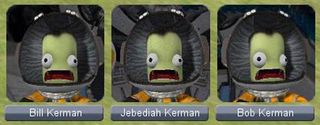
In KSP, my oopsortunities begin in the vehicle assembly building, where it's a snap to build a rocket ship. Literally.The parts snap together like LEGO blocks, and it's easy to assemble a massive, multi-stage rocket within a few minutes. Whether or not the rocket will work properly is a different matter entirely. What looks nifty in the assembly building may just sit there, too heavy to take off, or perhaps turn a bit explodey if it's not structurally sound. There are all sorts of things that can go wrong, like messing up the sequences of your rocket stages, using the wrong types of engines on the fuel tanks, or, say, hitting the building that sits next to the launch pad.
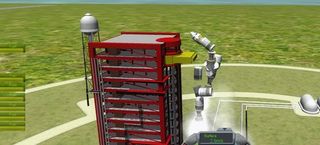
When things go awry, it's not a big deal. Just head back to the assembly room, make some tweaks, get some new astronauts, and try again. Even the worst oopsortunities teach me something, and just because my decouplers weren't strong enough to hold onto my solid boosters long enough to get into space, that doesn't mean my astronauts can't still have a successful landing.
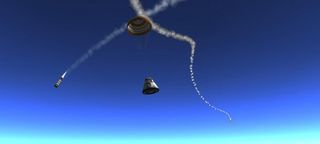
Actual successes can be a bit surprising after a long string of oopsortunities. Sometimes, the tensest moments in KSP come not while watching a launch fail but actually succeed. I had gotten so used to my rockets failing to escape Kerbin's gravity that when one finally did, I had no idea what to do. I hadn't learned yet how to put my craft in orbit, so I essentially just flew my astronaut away from Kerbin and deep into space. He's still up there, not orbiting Kerbin or the moon, but the Sun itself, and of course he's out of fuel, meaning he will be circling the solar system forever, or until his orbit decays, or until I've advanced my space program enough to go rescue him. I wouldn't hold my breath for that last option, though my astronaut might have to.
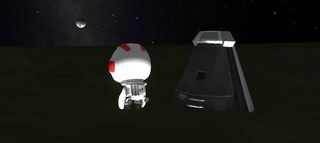
That is, however, one of the great things about KSP: provided you don't cancel the mission, your space capsules, astronauts, debris, and whatever else you've thrown off your planet will remain persistent in the game. At any point during my career, I'll be able to check on my marooned astronauts or look at how much junk I've spewed into orbit. My few successes and all my little oopsortunities, all perpetually floating around being tracked.
The biggest gaming news, reviews and hardware deals
Keep up to date with the most important stories and the best deals, as picked by the PC Gamer team.
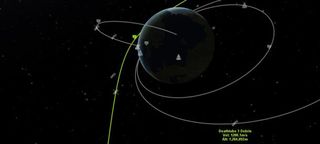
While I feel a bit guilty that I can't bring my two orbiting astronauts home, it's still a huge success for my space program. As miserable as those spacemen may be, at least they're orbiting something . I have another one simply headed straight out of the solar system, so powerful were the rockets that launched him and so poor was my ability to correct his trajectory.
See, I aimed directly at the moon after escaping Kerbin's gravity, though I didn't really take into account that the moon wouldn't actually be there when my rocket reached it, due to, y'know, the moon moving along on its own orbit. I just wound up shooting straight past it, which I'm counting as a successful oopsortunity, since if it had been there, I had literally no way to stop anyway, and would have crashed. So, that astronaut is headed straight out into the abyss forever, but at least he seems to be enjoying his spacewalks.
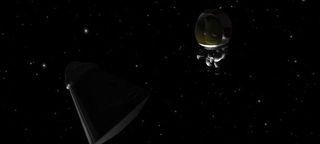
Someday, I hope to safely reach the moon, land there, have an astronaut pop the hatch and walk around, and then strand him there forever. I know, my goal should involve a return trip to Kerbin, but I'm not sure how many oopsortunities that would take. Thousands, probably. Land 'em and strand 'em. That's my motto.
Conclusion : This simulation is tons of fun to just play around with for those not gifted in science and math and learning things (me), and I suspect it's even better for those genuinely interested in and knowledgeable about physics and spaceflight. The free demo (scroll down a bit) gives you a decent selection of rocket parts to practice with and the moon to aim for, but the full alpha build version, at $23, gives you tons more, as well as an entire solar system of planets to (try to) visit. Absolutely worth the price.

Chris started playing PC games in the 1980s, started writing about them in the early 2000s, and (finally) started getting paid to write about them in the late 2000s. Following a few years as a regular freelancer, PC Gamer hired him in 2014, probably so he'd stop emailing them asking for more work. Chris has a love-hate relationship with survival games and an unhealthy fascination with the inner lives of NPCs. He's also a fan of offbeat simulation games, mods, and ignoring storylines in RPGs so he can make up his own.
Most Popular

